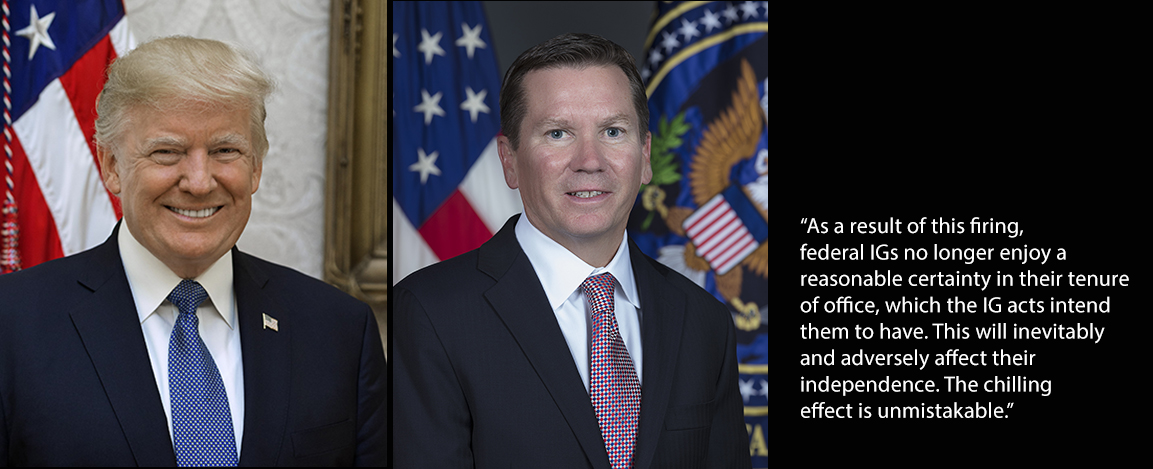The president’s power to remove Senate confirmed officials is not stated in the constitution. That power is grounded in the president’s constitutional duty to “take care that the laws be faithfully executed.” In this case, ironically, Trump removed Atkinson for having faithfully executed the law, explains Joel Brenner in a recent opinion piece.
Joel Brenner, formerly the inspector general of the National Security Agency (2002-2006) and the head of counterintelligence in the Office of the Director of National Intelligence (2006-2009), is a senior research fellow at the MIT Center for International Studies.
Last week saw a new entry inscribed in the catalog of sordid presidential behaviors, and this one will wreak further damage to the nation’s political culture. It was done in the dark, late at night, amid the distracting noise of the COVID-19 emergency. I mean the firing of Michael Atkinson, the intelligence community’s inspector general.
Atkinson’s sin was doing his job as it was meant to be done: Acting pursuant to statute, he forwarded to the Hill a whistleblower complaint regarding Trump’s threat to cut off military aid to Ukraine unless Ukraine’s president launched a groundless complaint into Hunter Biden’s supposed corruption in Ukraine. Atkinson’s action effectively spiked Trump’s effort to induce a foreign government to muddy Hunter’s father, Joe Biden, who is the only democrat Donald Trump is afraid of. To Trump, this was an act of consummate disloyalty, never to be forgiven. So the president bided his time until, late last Friday night, he fired Atkinson, saying he had “lost confidence” in him. Statutory obligations be damned, this president will not tolerate an executive branch political appointee who is not loyal to his agenda.
But Atkinson did not owe his loyalty to Donald Trump. He owed his loyalty to the constitution and to his duties under the statute that created his office and the Intelligence Community Whistleblower Protection Act. As an IG he was outside the management chain of command and thus had an unusual degree of independence, but he was a senate confirmed executive branch official. Atkinson was appointed by, and could therefore be removed by, the president.
The president’s power to remove senate confirmed officials is not stated in the constitution. That power is grounded in the president’s constitutional duty to “take care that the laws be faithfully executed.” In this case, ironically, Trump removed Atkinson for having faithfully executed the law.
There is substantial if disputed supreme court authority for the proposition that congress can place limits on the president’s ability to fire a senate-confirmed official who is not part of the Cabinet or the White House staff – which Atkinson was not. But congress has not done so in any of the acts creating inspectors general throughout the federal government. And with a lap-dog senate on a tight presidential leash, this president faces no congressionally imposed limits on behavior that until his inauguration day was beyond the pale of American political culture.
As a result of this firing, federal IGs no longer enjoy a reasonable certainty in their tenure of office, which the IG acts intend them to have. This will inevitably and adversely affect their independence. The chilling effect is unmistakable. (In my experience, public officials are not truly independent if they cannot make a living doing something else and have not thought through the circumstances in which they would refuse to continue to serve, but that’s another matter.)
Trump has consistently and often shockingly exploited the difference between the non-statutory norms of political culture and illegality. That he does so in the name of political conservatism is preposterous, because conservatives generally emphasize the importance of the decency, honesty, respect, traditions, and mutual accommodations without which no civil society can flourish, and which Trump trashes at every opportunity. Nevertheless, Trump has moved the boundaries of acceptable presidential style and action, or eliminated them altogether, and we would delude ourselves to think those boundaries will automatically revert to the status quo ante when he leaves office.
As for decency or its absence, Trump was not content to fire Atkinson. He slandered him too, calling him “a total disgrace” who did “a terrible job.” This is a lie. I met Atkinson when he was in the justice department and we were on opposite sides of a difficult negotiation. He was forthright, direct, and a good listener – important traits for any prosecutor or IG. I know him to be a decent man. As the IC IG, he did his office credit. But being slandered by the president of the United States hurts. When Atkinson finishes licking his wounds, however, he will realize that being slandered by this president for having done his duty is a badge of honor. He should wear it proudly.
Joel Brenner, formerly the inspector general of the National Security Agency (2002-2006) and the head of counterintelligence in the Office of the Director of National Intelligence (2006-2009), is a senior research fellow at the MIT Center for International Studies.




